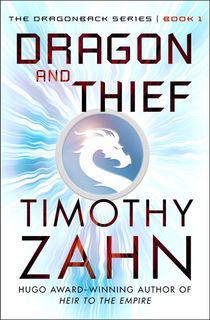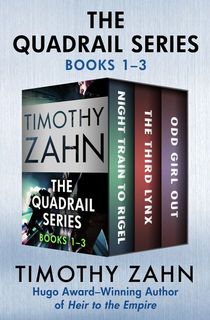To loosely paraphrase Poe Dameron in The Last Jedi, Timothy Zahn is the spark that lit the fire of the Star Wars resurgence.
Zahn's 1990s Thrawn trilogy introduced iconic characters like Mara Jade and the villainous Grand Admiral Thrawn to the Star Wars Expanded Universe. It also reignited interest in Star Wars, at a time when new content set in the galaxy far, far away was still rare.
Zahn's influence is still prominent in today's Star Wars media, even though the Expanded Universe was rebranded as Star Wars Legends and removed from canon in 2014.
One of these enduring characters is Thrawn, a Chiss admiral in the Imperial Navy. Now, in the new Ascendancy Trilogy, Zahn explores Thrawn's origins and the Chiss Ascendancy.
To celebrate the release of the first book in the new series,The Portalist spoke to Zahn about canon, worldbuilding, and the galaxy's most notorious Chiss.
How has your relationship to what it means for a story to be ‘canon’ evolved during your time writing Thrawn books?
When I first started with Star Wars in 1991, "canon" was really just the three classic movies. The books, comics, and games were all vetted and authorized by LFL [Lucasfilm], but we knew anything we put into them could be demolished if George decided to go a different direction. (And, in fact, all of Boba Fett’s backstories became alternate history when Attack of the Clones gave his “real” origin.)
Now, with the LFL Story Group vetting and coordinating everything, these latest Thrawn books are official canon and (reasonably) safe from future demolition.
I’ve enjoyed the memories you’ve shared on Facebook of writing earlier Star Wars books. Is there a book of yours, Star Wars or otherwise, that has a special place in your heart?
You’re asking me who my favorite child is. 😊 Seriously, I’m pleased with pretty much everything I’ve written, though of course not every book works for every reader. All of my various series – Star Wars, Cobra, Conquerors, Sibyl’s War, Dragonback, and Quadrail – came out much as I’d envisioned them, with all of them (hopefully) coming to satisfying conclusions.
If I was pressed, and if I limited myself to my standalone books, I’d have to say The Icarus Hunt is probably my favorite.
How do you view the relationship today between Star Wars as a space-fantasy versus a sci-fi story?
I never like putting labels on these things, mainly because it doesn’t seem very productive. As long as the universe is internally consistent, people and groups behave like they would in the real world, and the story and characters are captivating, I don’t need to pigeonhole it.
That said, I do like to put real-world science into my books when and where it works with the story. (I sometimes refer to these things as “Guest appearances by physics!”), so I’m comfortable straddling all those categorization lines anyway.
I was wondering if you could talk a little about your approach to worldbuilding. How important is it to you to have an established set of rules within a universe? How does that impact your approach to Star Wars?
Star Wars does have well-established rules, but they’ve never struck me as particularly stifling. Hyperdrive, lightsabers, and even the Force are easily adaptable to whatever story I want to tell. Though of course those boundaries affect my decisions on which stories I want to tell, just as I wouldn’t try to put a football game on a basketball court.
In general, the first rule of worldbuilding is to apply consequence testing to everything. If there are no starships but only trains in tubes running across the galaxy (as in the Quadrail series), how would that affect interstellar commerce and politics? If there were beings who needed to connect with symbionts (Dragonback), how would they see the world, and how would they function in society?
How did your understanding of Thrawn evolve while writing Chaos Rising?
Thrawn has been pretty well fixed in my mind ever since the Thrawn Trilogy back in the early 1990s. However, these newer books have given me deeper insight on the different types of situations he can/must face, the range of people he’s interacted with, and how those personal and social dynamics play out for both parties.
RELATED: 50 Epic Star Wars Quotes from a Galaxy Far, Far Away
We’re going through a very strange time right now. How has quarantine impacted your writing, if at all?
Mostly, it’s just meant a year with no conventions. That’s good in that it’s given me more time to write, but bad in that it’s eliminated all face-to-face interaction with fans and readers. I’m looking forward to hopefully making up a bit for lost time next year.
Are there any books you’ve turned to as a comfort-read during covid?
Not really. I mostly just keep working. I guess that sorta counts as turning to books?
Though I’ll admit to occasionally binge-watching old favorite movies and TV shows. (White Collar, Leverage, Burn Notice, and others.)
Download Chaos Rising today!





.jpg?w=640)